#Grief of Alexander the Great
Text
And Alexander Wept for Hephaistion....
If you don’t mind, I wanted to ask, you said something along the lines of: by the time Alexander was coming closer to his death, he had recovered from the grief of Hephaistion’s death (if I’m remembering this correctly; I’m so sorry I have a fuzzy memory) how long do you think he mourned Hephaistion?
------------------
This was an ask via message, so putting it here to reply publicly, as it may be of interest to others.
First, however, I want to mention a pair of articles I wrote many years ago now, but which are still valid:
“The Mourning of Alexander the Great,” Syllecta Classica 12 (2001), 98-145.
“Some New Thoughts on the Death of Alexander the Great,” with Eugene N. Borza (lead author), The Ancient World 31.1 (2000), 1-9. (I wrote the last 1/3 of it.)
The first, in particular, is an in-depth analysis of Alexander’s behavior after Hephaistion died. I’m still rather proud of it, as it brings together two quite diverse fields: bereavement + Alexander studies. If I had a critique for it now, it’s that I didn’t analyze the stories inherent in the primary sources, but that also wasn’t my intention in writing it. I specifically say that I do not plan to pick apart which reports of Alexander’s behavior are likely authentic and which aren’t. My goal was to evaluate all of them in terms of possible evidence of pathological bereavement, according to the (then) DSM III-R (et al.).
TL;DR version of the article: Alexander’s mourning was NORMAL and followed recognized patterns, if one allows for the loss of someone extremely close, a spouse/similar.
Yes, there were complicating factors. BUT he did not go crazy with grief.
Unfortunately, this article is far less known than the “An Atypical Affair” article on Alexander and Hephaistion’s relationship. That’s too bad, as the “His grieving was extreme!” persists among even some of my colleagues, never mind those outside the field of Macedoniasts. (It’s also admittedly possible that they were simply unconvinced by my arguments, but in that case, one usually cites and says so.)
If I could put a giant blinking neon light on one of my earlier articles to get it more attention, that would be the one I’d point to.
The second article—or my 1/3rd of it anyway—deals with the possible effects of deep mourning on the immune system of adult males of Alexander’s age group. Yes, according to some limited research, it does have an impact that increases susceptibility to infectious disease. Add his poor overall physical health after all those battles (and Macedonian-style symposial drinking), and he was just too spent to fight off the typhoid or malaria or whatever fever disease got him.
Ergo, he died roughly 8 months after Hephaistion. We don’t have a date for the latter’s death, but sometime in October or November of 324 BCE is the window. Alexander died June 10th, 323 … or possibly a day or so later if he were in a paralysis too deep for his breathing to be ascertained. (As per Gene’s part of the article.)
The dating is important, as it affects where he (probably) was in his mourning process.

Mourning follows a somewhat predictable pattern, and one of the biggest mistakes made by those unfamiliar with human mourning is to underestimate (often by a lot) just how long mourning takes … even perfectly normal, healthy mourning.
For a major loss, main mourning takes up to a year. No joke. That’s why bereavement counselors try to keep the bereaved from making any permanent decisions within that year. They’re still very much being buffeted by the winds of grief, even if they want to pretend they aren’t. But even after the year anniversary—and marking it with some sort of formal ceremony helps!*—mourning continues off-and-on (sometimes really intense for a few hours or even a few days) for up to 5 years. Again, no joke. Some bereavement studies experts don’t really consider a person truly recovered (note I never say “over it”) for as long as 10 years.
Additionally, ANY deep loss triggers mourning; it doesn’t have to be death. A divorce will result in mourning, even if the people in the marriage wanted to divorce. It’s still a “death” of sorts. Moving some distance away, graduation, and retirement can all set off mourning. This surprises people, that mourning can attach even to “happy” circumstances. Anything that includes an ending will set off mourning, albeit it may not be that intense.
But THE #1 and #2 most devastating losses are the loss of a child and the loss of a spouse/spouse-like figure. Period.
So, a slight correction to the question, I didn’t say he’d recovered from his mourning, but that he was beginning to emerge from the deepest parts of mourning.
What do I mean by that? There are (roughly) 3(-4) major phases of mourning. The speed at which we pass through these varies, dependent on the type of death and our closeness to the deceased. (The first article goes into that in more depth.)
Shock phase, which is typically anywhere from a few days to about 2 weeks.
Deep mourning phase, where the bereaved must come to terms with the loss. The bereaved cycles through a series of stages (not the best term) and, more importantly, struggles with certain TASKS of mourning (as per Worden). Again, the length of this phase can vary, but for serious losses, it can take up to 8-9 months, with the worst of it usually hitting 3-6 months. There is an intense focus on the deceased and the bereaved person may want little to do with new people and vacillate between wanting to talk a lot about the deceased or wanting to give away all their stuff because it’s too painful. Anger, bargaining, depression, self-blame … all are typical of this phase. It’s INTENSE. It really does take months, and people routinely underestimate it.
Re-emergent phase, where the bereaved begins to take an interest again in the external world, may make new friends and new plans that don’t involve the deceased. The deceased is far, far from forgotten, but the bereaved is learning to live without the dead person.
Continued bereavement would be a fourth phase past the one-year anniversary, where the bereaved will still experience grief, sometimes very intense when triggered by a particular memory, a birthday, or anniversaries. But the overall “worst” part of mourning is past.
Finally, especially in the deepest part of mourning, the depression felt by the bereaved is on par with clinical depression, but (except for rare cases) the bereaved absolutely should not take or be prescribed antidepressants as these interrupt the mourning process.
Yes, it hurts like hell but one can only go through, not over, around, or under. Through.
In some cases, however, bereavement becomes “complicated,” resulting in what’s referred to as pathological bereavement, by which I mean only not normal (I wouldn’t even say abnormal). Sudden death (as with Hephaistion) IS one factor that can complicate mourning, but it doesn’t necessarily lead to full-blown pathological grief. In the article, I evaluate all Alexander’s listed behaviors and explain why my final conclusion is that his bereavement was sharp, but not pathological.
Alexander’s behavior in the last few months showed aspects of the third phase. He was planning (or probably returning to planning) his next campaign and thinking about improvements to the city of Babylon apparently with the intention of making it his eastern capital. Yes, he was also planning Hephaistion’s funeral, but the other two things were new and show re-engagement.
So Alexander’s mourning had not ended before he died himself, only shifted. Even if he’d lived another 5 years, he’d still have experienced bereavement off and on.
Remember, grieving takes TIME. More time than you expect.
If you know someone going through grief, especially for a family member, beloved, or very close friend … give them space. Let them cry. Encourage them to talk about the lost person if they want to, but don’t force it if they don’t want to. Don’t argue with their theology/beliefs about death or their gallows humor, but also don’t shove your theology/beliefs about death, or your gallows humor, onto them. Read the room.
MOST OF ALL, JUST BE PRESENT. It matters less what you say than that you’re there. They may not even remember what you say later; they will remember you showed up.
—————-
* In fact, world cultures that have traditional, one-year anniversary ceremonies routinely show better outcomes for mourning individuals.
#asks#Alexander the Great#Hephaistion#Hephaestion#death of Hephaistion#death of Hephaestion#Mourning of Alexander the Great#bereavement#mourning#tasks of mourning#stages of grief#Alexander the Great's grief#alexander x hephaestion#alexander x hephaistion
31 notes
·
View notes
Text
death of stalin esque movie but its about alexanders gernerals post hephaestions death trying to outdo each other with increasingly sexi likenesses of him in an attempt to get alexander off the ledge meanwhile he is at the oracle of siwa throwing up crying shitting begging can they plssssss PLS let him worship hephaestion as a god pwetty pwease 😭😭😭😭
#also hes insecure about his impulsive new short haired grief cut. thats a whole sub plot#txt.me#history#alexander the great
15 notes
·
View notes
Text
"He is gone; and all times when he was there seem like lost riches."
—Mary Renault, The Persian Boy
25 notes
·
View notes
Text
Found God
Thor: Love & Thunder (2022) by Taika Waititi
[A little while ago, I promised you a review of the latest MCU movie, here it is. This review was first published on my Marvel blog.]
Ever since I watched Thor: Love & Thunder last Sunday I’ve been at war with myself. It wasn’t really my best movie experience, not when it comes to outer circumstances or my state of mind. On Tuesday, I woke with a…

View On WordPress
#chris hemsworth#christian bale#gods#gorr the godbutcher#great villain#grief#jaimie alexander#jane foster#Korg#lady sif#Marvel Cinematic Universe#marvel studios#mcu#Mighty Thor#natalie portman#no Loki#taika waititi#tessa thompson#thor#Thor: Love & Thunder#valkyrie
2 notes
·
View notes
Text
Yan!Alexander the Great w/ Soldier's Pregnant Widow!Reader
❝ 📜 — lady l: this is a commission that I was very happy to do! I'm sorry for the delay, I confess that I had forgotten this in my drafts and only remembered it after reading your messagem, anon! I hope you enjoy it and, as requested, it is more based on Alexander's feelings for the Reader. Forgive me for any mistakes! ❤️
❝tw: mention of death, mourning. pregnancy and fluff.
❝📜pairing: yandere!alexander the great x female!reader.
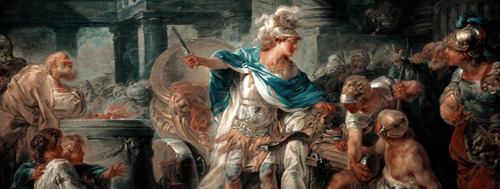
You were the wife of one of Alexander's cavalry soldiers who, unlike many other soldiers' wives, decided to accompany him to war. You loved your husband deeply and did not want to be separated from him.
Your husband also loved you deeply. He wasn't a general or a high-ranking officer, but your husband tried to make you as comfortable as possible in this violent environment. He was loyal to you, something rare but one you appreciated. You loved him with everything in you.
Until the day you lost him. During the Battle of Granicus, your husband died in battle and your world collapsed. You had lost the man you loved and it felt like an endless road. Alexander, being the beloved King that he was, buried the dead soldiers with the necessary honors and spoke to the wives present in the camp. And one of them was you.
Alexander was immediately enchanted by you. He was surprised at how you handled your grief, clearly you loved your husband very much and the pain of the loss you felt captivated him. He didn't take long to approach you subtly at first.
Alexander was kind and protective, offering his condolences and staying by your side. His words were kind and his discreet smiles were reserved just for you. More observant people didn't take long to notice the King's interest in you, but they never dared to say anything, not when they knew his temperament.
You found yourself lost in a sea of pain and sadness, unable to find comfort in anything around you. Alexander's comforting presence was like an anchor in the midst of the storm, offering support and compassion in such a dark time. He understood your pain as he had also lost soldiers close to him.
Alexander felt compelled to protect and care for you, not only out of gratitude for your husband's sacrifice, but also because he genuinely cared for you. His discreet smiles and kind gestures were an attempt to ease your pain, to be a ray of light amid the darkness you faced.
Although you fought your feelings, you found yourself enjoying the King's presence. But you soon discovered that you were pregnant by your late husband and you decided to focus on honoring your husband's memory and focusing on the baby growing inside you.
Alexander didn't like it at all when you tried to move away from him but he soon understood why. He wasn't angry or anything, but surprised and slightly bothered. You would have a child, something he wanted, but it wouldn't be with him. He couldn't blame you, though, it wasn't your fault.
As time passed, your belly grew and the pain of loss lessened, you found yourself more and more involved in the camp's activities, keeping yourself busy to keep away the thoughts that haunted you at night. And you found yourself increasingly close to Alexander, who made his feelings for you very clear.
He respected the fact that you weren't ready to get married due to the fact that you were pregnant, he could wait until the baby was born. But he wasn't far from you, spending his free time by your side while also taking care of you. You owned your own tent and personal effects, along with those of your late husband.
In time, your husband's child was born, and you held it in your arms with love and sadness. It was a part of him you would carry forever, a living reminder of the man you loved so much. Alexander was present and he acted as if your child were his. He didn't even like it when people mentioned it wasn't his.
You were his and your baby was his too. Alexander was skeptical about it at first but he warmed up to the idea. The mourning period is over and your child has been born, now it is time for you to become his wife and have children of his own.

#history#yandere history#yandere historical characters#alexander the great x reader#yandere alexander the great x reader#yandere alexander the great#yandere headcanons#headcanons#soft yandere#commission#x reader
318 notes
·
View notes
Text









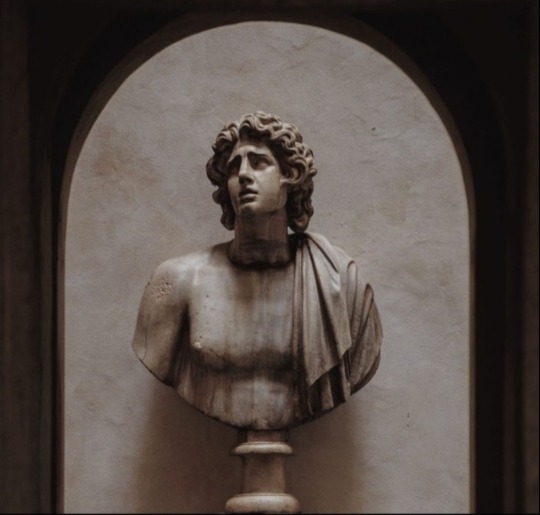
shattered
Mieko Kawakami, Breasts and Eggs, tr. by Sam Bett and David Boyd // Louise Glück, Adult Grief // Horace Vernet, The Maiden’s Lament (oil on canvas) // Mona Sa’udi, “When the loneliness of the tomb,” from Women of the Fertile Crescent: An Anthology of Modern Poetry by Arab Women, tr. by Kamal Boullata // Photography by 西游朽 (xiuxiukong) // Mark Strand, "Keeping Things Whole" from Selected Poems by Mark Strand, 1979 // Clarice Lispector, A Breath of Life, 1978 (paraphrased) // Graveyard statue in Coburg, Germany // Anaïs Nin, Fire: From “A Journal of Love”: The Unexpurgated Diary of Anaïs Nin (paraphrased) // Bust of Alexander the Great, found in Palazzo Massimo courtyard, Lancellotti, Rome
#web weaving#web weave#literary parallels#parallels#comparative#alone#isolated#isolation#dissociation#dissociated#depersonalization#lonely#depressed#depression#no friends#void#a void#sad#sadness#sorrow#ruined#broken#quote#quotes#hopelessness#pessimistic#nihilistic#cynical#cynicism#dark acadamia aesthetic
650 notes
·
View notes
Text
Random Doctor Who Facts You Might Not Know, Part 4
While trying to figure out how Jenny was the Fifth Doctor's daughter, the Nine suggested he might be her father or her mother.
The Nun once shot and imprisoned the Tenth Doctor on her TARDIS, using a psychic shroud to take on his appearance temporarily before "regenerating" into her own body.
The Eighth Doctor has traveled with both a Cyberman and an Ice Warrior before (albeit not at the same time).
Jasper and Stewart are a pair of Fledershrews (a type of bat) that took residence in the TARDIS. The Doctor considered them to be good friends.
The Doctor had at least one grandfather and seven grandmothers.
Horses can be cyber-converted.
The Seventh Doctor took Ace back in time to kill the would-be dictator as well, but they were also unable to go through with it.
At the same time the Fifteenth Doctor and Ruby were dealing with goblins (24/12/2023), the Seventh Doctor and Ace were in a Los Angeles toyshop.
Wilfred Mott enlisted while he was still underage.
Orlando Bloom stars in Indiana Jones movie remakes.
Sam Jones knew what the Doctor's name is.
By some accounts, the Doctor removed his name from time, meaning only they and the Master (as well as anyone they later told) remembered it.
Ian Chesterton was taught how to ride a horse by Alexander the Great.
The TARDIS once dematerialized with a Nazi (played by David Tennant) half in, half out, leading to his incredibly gruesome death.
On Harmony, an idyllic planet, the locals harvested any visitors for food as the other animals had all died out.
Sometimes, the Doctor has worked to actively change history, like the time the Second Doctor tried to save Horatio Nelson from dying in the Battle of Trafalgar.
As the First Doctor regenerated into the Second, the TARDIS also somewhat regenerated, shrinking around fifteen centimeters.
River Song has eleven siblings such as Brooke, Stream, Lake, Creek, H-One, H-Two, O, etc. All of them are clones created by Madame Kovarian from River's DNA.
Speaking of River, she's been married to both Bernice Summerfield and Jack Harkness before.
Amy Pond was once mutated into an almost butterfly-like creature.
The Master does not like David Attenborough.
At one point, the most wanted criminal in the galaxy was the Master, and the Rani was second most wanted.
Snow White and the Seven Keys to Doomsday was a Gallifreyan bedtime story the Eleventh Doctor recalled enjoying.
In this story, Rassilon would ask the Matrix daily: "Matrix, Matrix that sees over all, who has the power to make Gallifrey fall?" The Matrix would always respond with: "Only you, oh Rassilon. Only you, through the Eye of Harmony have that power." One day, the Matrix added: "Snowana the Fair, using the Keys of Doomsday, she has the power to destroy all of Gallifrey." Rassilon was greatly angered by this and banished Snowana to the wastelands, expecting her to die, but instead, she grew into Snow White. Selendor had created a great weapon that could be used to destroy cities and fashioned seven keys to it, one for each sin of the Time Lords. He gave one key to Snow White expecting her to get some revenge, but she instead ran away and created a force field around her and the keys. Selendor died of grief for his lost keys
Part 1, 2, 3, 4, 5, 6, 7, 8, 9, 10, 11, 12, 13, 14, 15, 16, 17, 18, 19, 20, 21, 22, 23, 24, 25, 26, 27, 28
#doctor who#classic who#new who#dw eu#doctor who eu#doctor who expanded universe#big finish doctor who#big finish audios#big finish#the master#the rani#first doctor#second doctor#eleventh doctor#river song#bernice summerfield#jack harkness#amy pond#ian chesterton#david tennant#eighth doctor#sam jones#fifteenth doctor#ruby sunday#seventh doctor#ace mcshane#wilfred mott#fifth doctor#tenth doctor#the nun
151 notes
·
View notes
Note
What do you mean when you say that Pompey is a lover in a story of inescapable violence? I am extremely intrigued
the Late Republic is a stage of violence intent on gorging itself on this violence, the structure of the system leaves no other outcome.
Pompey is both someone born into this cycle and someone who is an acting hand of violence. He fashions himself after a military ideal, Alexander the Great, he positions himself as Sulla’s successor in the arena of political spectacle (rising/setting sun), he is Rome’s conquering hand.
He’s also, in Plutarch’s biography, intensely aware of matters of love and romance and does not treat them as an idle and casual affair. It is, in some way, an inherent part of his character. He is the ideal of a husband, even if it conflicts with whatever other ideals he’s supposed to embody, and apparently trades in his role as a general to remain in Rome with his wife.
We are told that Flora the courtesan, when she was now quite old, always took delight in telling about her former intimacy with Pompey, saying that she never left his embraces without bearing the marks of his teeth. Furthermore, Flora would tell how Geminius, one of Pompey's companions, fell in love with her and annoyed her greatly by his attentions; and when she declared that she could not consent to his wishes because of Pompey, Geminius laid the matter before Pompey. Pompey, accordingly, turned her over to Geminius, but never afterwards had any thing at all to do with her himself, although he was thought to be enamoured of her; and she herself did not take this treatment as a mere courtesan would, but was sick for a long time with grief and longing. (…) Moreover, Pompey also treated the wife of Demetrius his freedman (who had the greatest influence with him and left an estate of four thousand talents) with a lack of courtesy and generosity unusual in him, fearing lest men should think him conquered by her beauty, which was irresistible and far-famed. But though he was so extremely cautious in such matters and on his guard, still he could not escape the censures of his enemies on this head, but was accused of illicit relations with married women, to gratify whom, it was said, he neglected and betrayed many public interests.
Plut. Pomp. 2
All this won him admiration and affection; but on the other hand he incurred a corresponding displeasure, because he handed over his provinces and his armies to legates who were his friends, while he himself spent his time with his wife among the pleasure-places of Italy, going from one to another, either because he loved her, or because she loved him so that he could not bear to leave her; for this reason too is given. Indeed, the fondness of the young woman for her husband was notorious, although the mature age of Pompey did not invite such devotion. The reason for it, however, seems to have lain in the chaste restraint of her husband, who knew only his wedded wife, and in the dignity of his manners, which were not severe, but full of grace, and especially attractive to women, as even Flora the courtesan may be allowed to testify.
Plut. Pomp. 53
Nevertheless, the marriage was displeasing to some on account of the disparity in years; for Cornelia's youth made her a fitter match for a son of Pompey. 3 Those, too, who were more critical, considered that Pompey was neglectful of the unhappy condition of the city, which had chosen him as her physician and put herself in his sole charge; whereas he was decking himself with garlands and celebrating nuptials, though he ought to have regarded his very consulship as a calamity, since it would not have been given him in such an illegal manner had his country been prosperous.
Plut. Pomp. 55
The messenger, finding her in this mood, could not bring himself to salute her, but indicated to her the most and greatest of his misfortunes by his tears rather than by his speech, and merely bade her hasten if she had any wish to see Pompey with one ship only, and that not his own. When she heard this, she cast herself upon the ground and lay there a long time bereft of sense and speech. At last, however, and with difficulty, she regained her senses, and perceiving that the occasion was not one for tears and lamentations, she ran out through the city to the sea. Pompey met her and caught her in his arms as she tottered and was falling. "I see thee," she cried, "husband, not by thy fortune, but by mine, reduced to one small vessel, thou who before thy marriage with Cornelia didst sail this sea with five hundred ships. Why hast thou come to see me, and why didst thou not leave to her cruel destiny one who has infected thee also with an evil fortune so great? What a happy woman I had been if I had died before hearing that Publius, whose virgin bride I was, was slain among the Parthians! And how wise if, even after his death, as I essayed to do, I had put an end to my own life! But I was spared, it seems, to bring ruin also upon Pompey the Great."
So spake Cornelia, as we are told, and Pompey answered, saying: "It is true, Cornelia, thou hast known but one fortune to be mine, the better one, and this has perhaps deceived thee too, as well as me, in that it remained with me longer than is customary. But this reverse also we must bear, since we are mortals, and we must still put fortune to the test. For I can have some hope of rising again from this low estate to my former high estate, since I fell from that to this.”
Plut. Pomp. 74-75
I have some vague thought in here about how Pompey was entrusted with Rome’s safety, and that conflicts with his Lover status because you can’t love something more than Rome without Rome deciding to cast you out, and it also prevents him from reclaiming his Soldier role in the ensuing war with Caesar. Doomed by Rome, doomed by Love, doomed by Fortune, etc. but also simply the inevitable cycle of war and violence, the ever turning wheel of Rome.
#ask tag#he’s a weird guy. also a ghost. anyway lovers and soldiers die the same. in a ditch.#if I had to pick between Pompey and Antony I would pick Pompey with zero hesitation
125 notes
·
View notes
Text
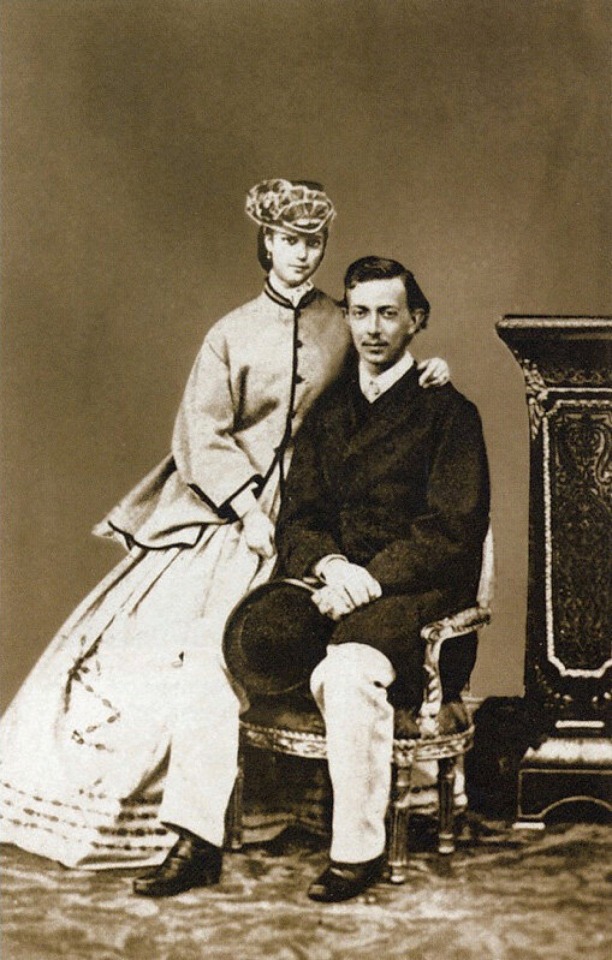
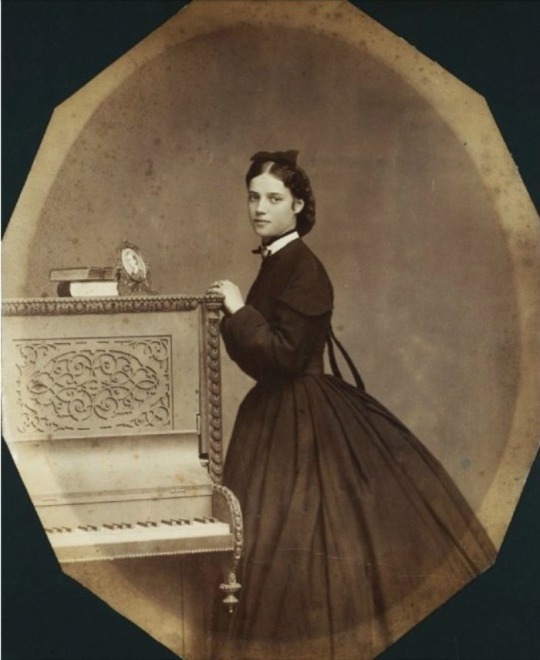
“Your sympathy is a great comfort to me and my daughter, who has endured such a severe trial at such an early age... She tells me that she would not for anything in the world wish to change the past, no matter how short, but happy it was; and I will never forget his look when the Tsar led her by the hand to his bed! It was pure happiness, and he recognized her all day when he was dying. He said goodbye to her, kissed her, and held her hand tightly in his until he died! We were on the road for four days and four nights, and she never left his bedside, kneeling next to him day and night, until at one o'clock in the afternoon she kissed him and he exhaled his young life! It was terrible for me, because I loved him very much and saw how all the happiness of the poor young bride had faded away... Minnie went to Darmstadt for the day to see his parents again. The whole dear family was so kind and sweet to her that the separation was doubly painful for her."
- Queen Louise of Denmark in a letter to Queen Victoria, on her daughter Princess Dagmar’s grief at the death of her fiancé, Grand Duke Nicholas Alexandrovich of Russia. Dagmar went on to become Empress Maria Alexandrovna as the wife of Nicholas’s brother, Emperor Alexander III. Their firstborn son was named after the uncle he never knew, he is known to history as Nicholas II, the last Russian emperor.
#queen louise of denmark#queen victoria of the united kingdom#empress maria feodorovna#grand duke nicholas alexandrovich#romanov#russia#quotes
73 notes
·
View notes
Text
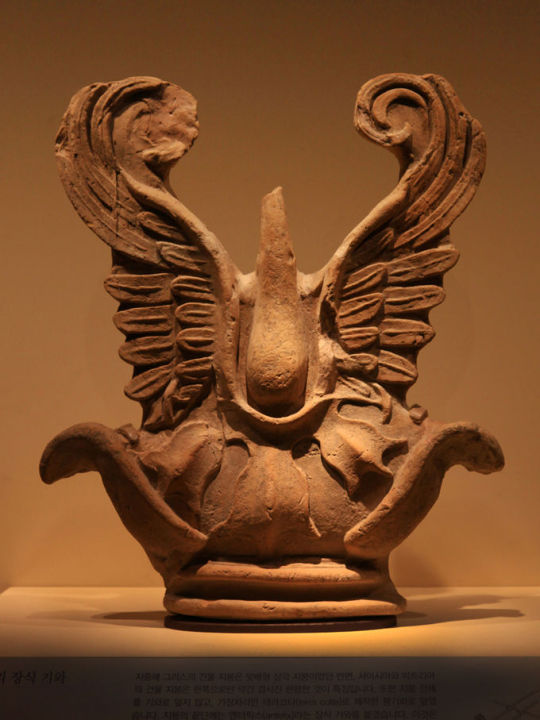


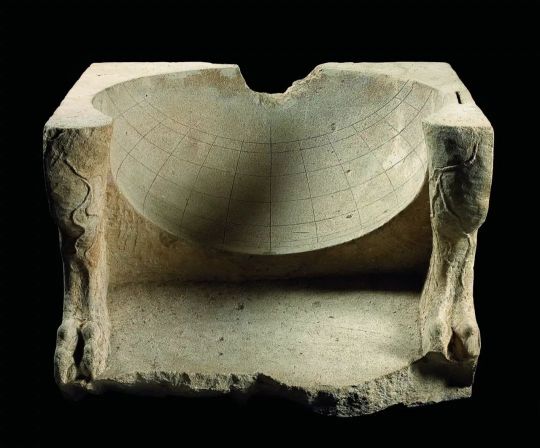
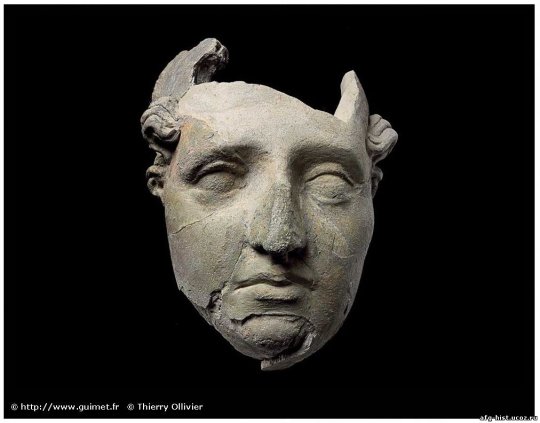
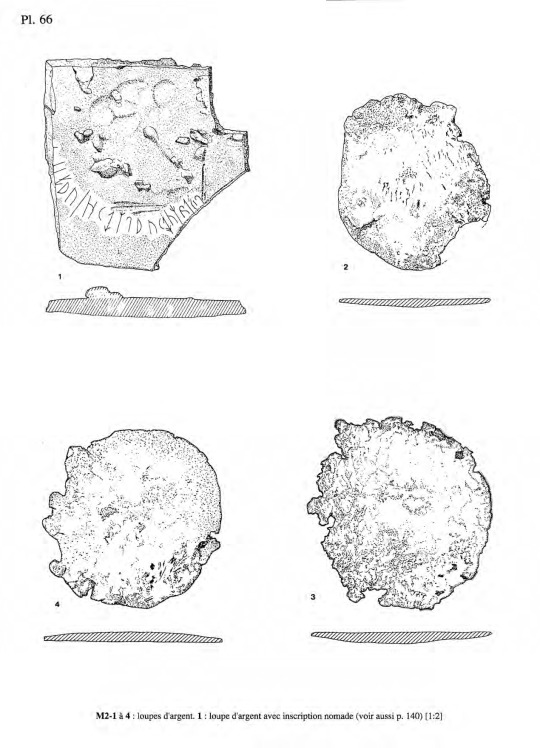

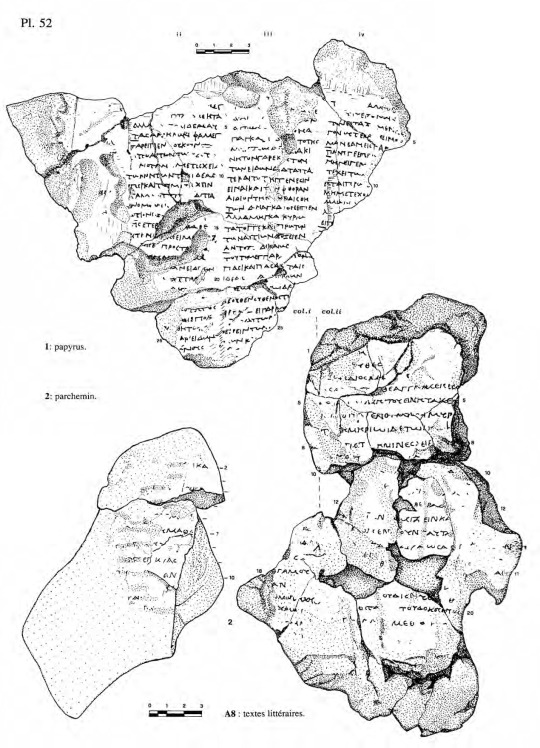
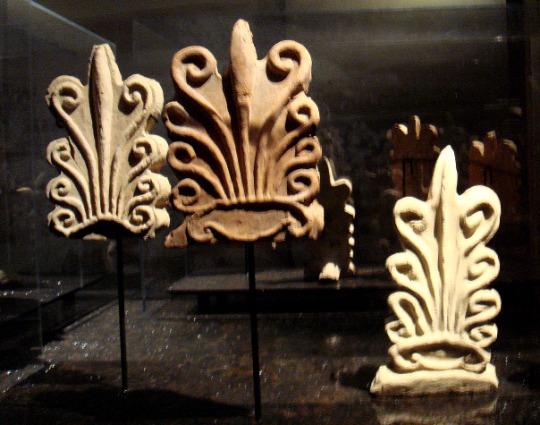

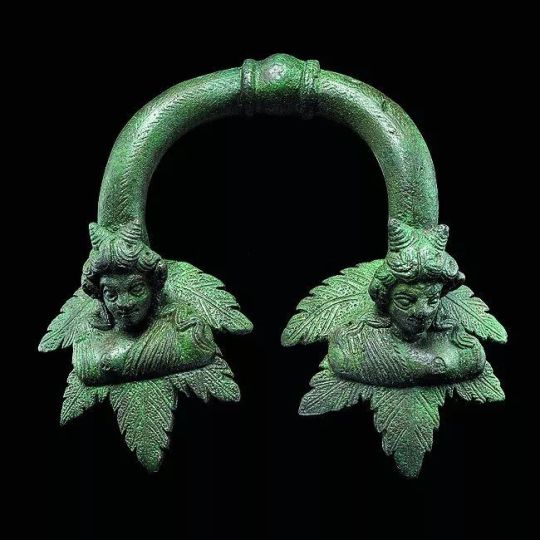



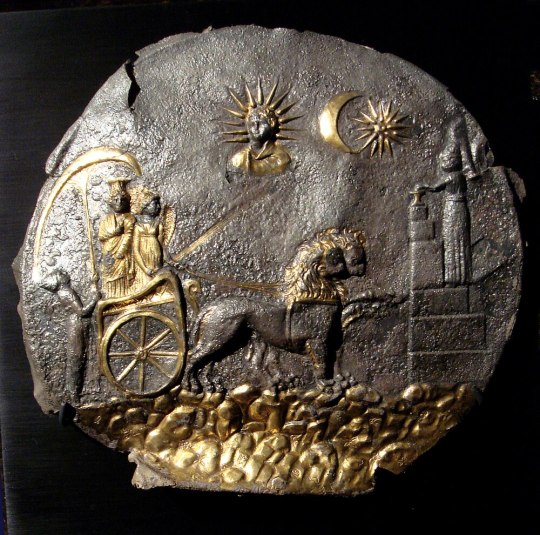

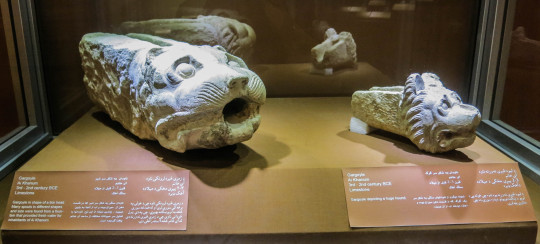




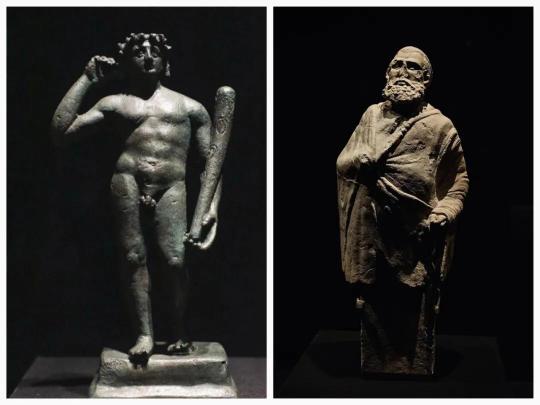
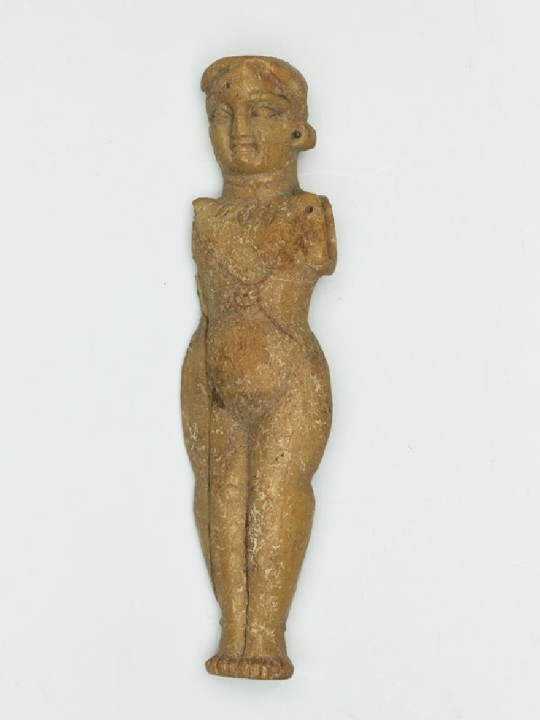





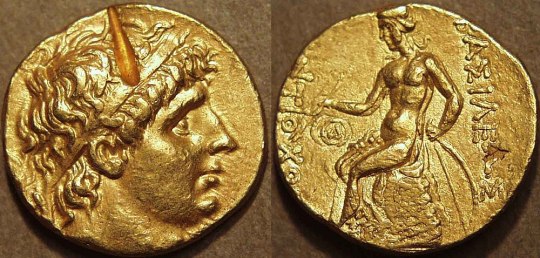

Ai Khanoum 3rd C. BCE - 2nd C. CE. More images on my blog, link at bottom.
"These wise sayings of men of old,
The words of famous men, are consecrated
At holy Delphi, where Klearchos copied them from carefully
To set them up, shining from afar, in the sanctuary of Kineas.
As a child, be well behaved;
As a young man, self-controlled;
In middle age, be just;
As an elder, be of good counsel;
And when you come to the end, be without grief.
—trans. of Ai Khanoum stele by Shane Wallace and Rachel Mairs.
Ai-Khanoum (/aɪ ˈhɑːnjuːm/, meaning Lady Moon; Uzbek Latin: Oyxonim) is the archaeological site of a Hellenistic city in Takhar Province, Afghanistan. The city, whose original name is unknown, was likely founded by an early ruler of the Seleucid Empire and served as a military and economic centre for the rulers of the Greco-Bactrian Kingdom until its destruction c. 145 BC. Rediscovered in 1961, the ruins of the city were excavated by a French team of archaeologists until the outbreak of conflict in Afghanistan in the late 1970s.
The city was probably founded between 300 and 285 BC by an official acting on the orders of Seleucus I Nicator or his son Antiochus I Soter, the first two rulers of the Seleucid dynasty. There is a possibility that the site was known to the earlier Achaemenid Empire, who established a small fort nearby. Ai-Khanoum was originally thought to have been a foundation of Alexander the Great, perhaps as Alexandria Oxiana, but this theory is now considered unlikely. Located at the confluence of the Amu Darya (a.k.a. Oxus) and Kokcha rivers, surrounded by well-irrigated farmland, the city itself was divided between a lower town and a 60-metre-high (200 ft) acropolis. Although not situated on a major trade route, Ai-Khanoum controlled access to both mining in the Hindu Kush and strategically important choke points. Extensive fortifications, which were continually maintained and improved, surrounded the city.
Many of the present ruins date from the time of Eucratides I, who substantially redeveloped the city and who may have renamed it Eucratideia, after himself. Soon after his death c. 145 BC, the Greco-Bactrian kingdom collapsed—Ai-Khanoum was captured by Saka invaders and was generally abandoned, although parts of the city were sporadically occupied until the 2nd century AD. Hellenistic culture in the region would persist longer only in the Indo-Greek kingdoms.
It is likely that Ai-Khanoum was already under attack by nomadic tribes when Eucratides was assassinated in around 144 BC. This invasion was probably carried out by Saka tribes driven south by the Yuezhi peoples, who in turn formed a second wave of invaders, in around 130 BC. The treasury complex shows signs of having been plundered in two assaults, fifteen years apart.
Although the first assault led to the end of Hellenistic rule in the city, Ai-Khanoum continued to be inhabited; it remains unknown whether this reoccupation was effected by Greco-Bactrian survivors or nomadic invaders. During this time, public buildings such as the palace and sanctuary were repurposed as residential dwellings and the city maintained some semblance of normality: some sort of authority, possibly cultish in origin, encouraged the inhabitants to reuse the raw building materials now freely available in the city for their own ends, whether for construction or trade. A silver ingot engraved with runic letters and buried in a treasury room provides support for the theory that the Saka occupied the city, with tombs containing typical nomadic grave goods also being dug into the acropolis and the gymnasium. The reoccupation of the city was soon terminated by a huge fire. It is unknown when the final occupants of Ai-Khanoum abandoned the city. The final signs of any habitation date from the 2nd century AD; by this time, more than 2.5 metres (8.2 ft) of earth had accumulated in the palace.
While on a hunting trip in 1961, the King of Afghanistan, Mohammed Zahir Shah, rediscovered the city. An archaeological delegation, led by Paul Bernard, unearthed the remains of a huge palace in the lower town, along with a large gymnasium, a theatre capable of holding 6,000 spectators, an arsenal, and two sanctuaries. Several inscriptions were found, along with coins, artefacts, and ceramics. The onset of the Soviet-Afghan War in the late 1970s halted scholarly progress and during the following conflicts in Afghanistan, the site was extensively looted."
-taken from Wikipedia
...
"The silver ingot engraved with runic characters found during the excavations of the Treasury could suggest they were Sakā/Sai. This inscription comprises 21 characters of a script and a language that are unknown and both attributed to nomadic people of Sakā origin, by comparison with a dozen similar inscriptions coming from an area extending from Ghazni in Afghanistan to Almaty in Kazakhstan, and dated between the 5th century BC and the 8th century AD."
-taken from Ai Khanoum after 145 BC: The Post-Palatial Occupation by Laurianne Martinez-Sève, University of Lille, 2018
#ancient history#antiquities#art#paganism#statue#museums#sculpture#history#greek art#greek gods#ancient greek#greek myth#scythian#pagan#ancient art#afghanistan
186 notes
·
View notes
Text


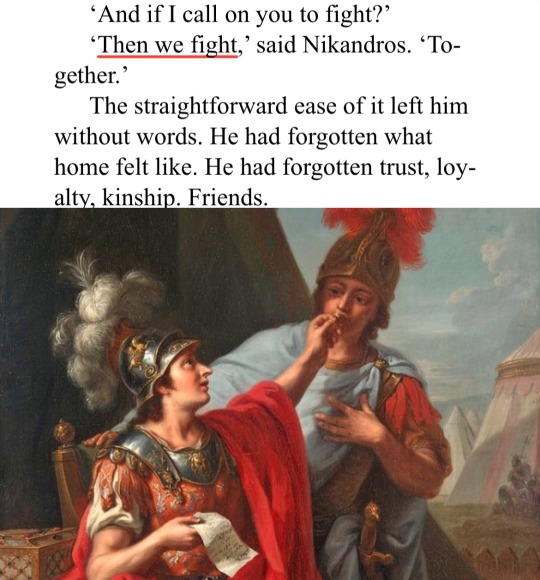

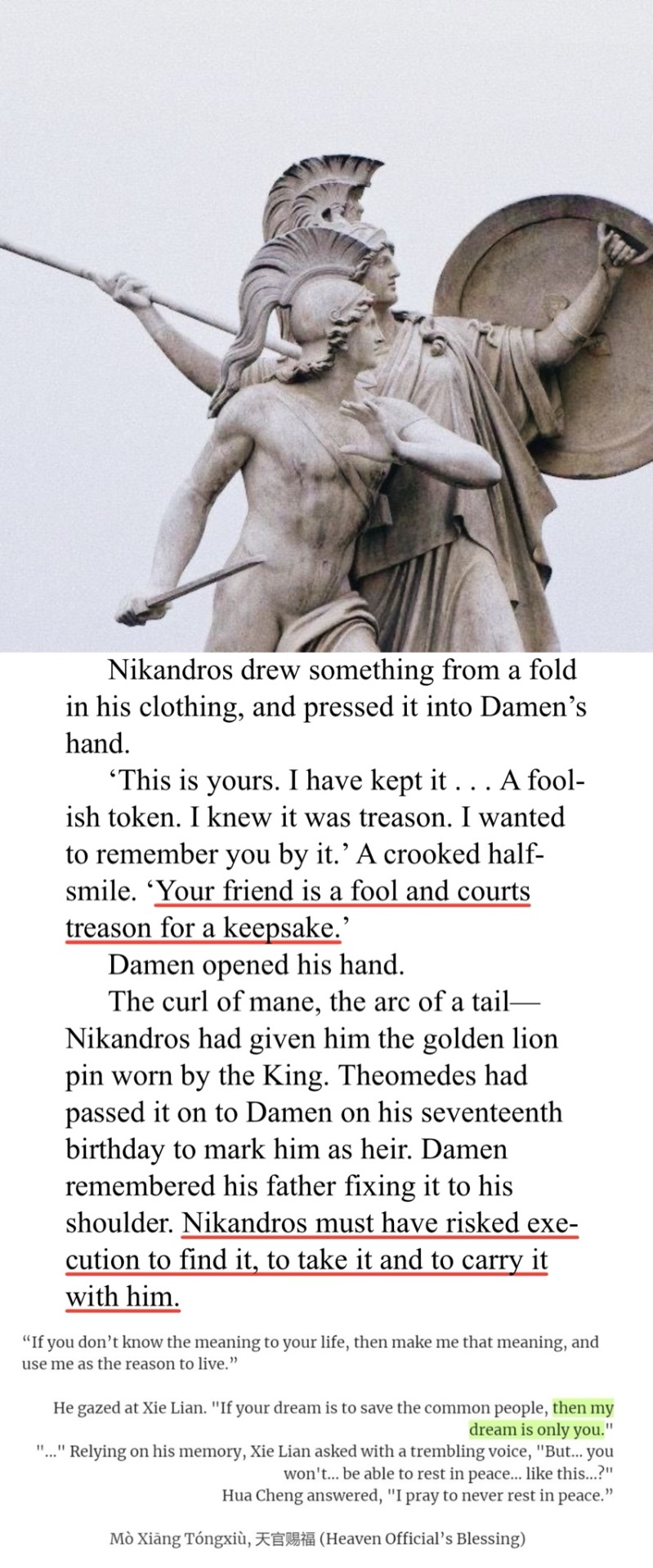





damen love fest 2023 / day 2: akielos
damen & nikandros
prince’s gambit by c.s. pacat | grief lessons: four plays by euripides, translated by anne carson | kigiom | kings rising by c.s. pacat | heaven official’s blessing by mxtx | take me to the church by hozier | alexander (2004) | history channel's ancient empires: episode one, alexander the great
#damenlovefest2023#damensource#captive prince#THEM!!!!!!#god they're so fascinating!!!#damen’s arc of attempting to reach nik aka akielos aka his home 🥺🥺 i’m so emo
118 notes
·
View notes
Note
Hi Dr.Reames. So glad to see your blogs. You said that in your novel, Alexander and Hephaistion had ups and downs in their relationship, even though they had always loved each other so much. Given how long the relationship has lasted, I suspect the history might have been the similar,too. I'd like to ask that what do you think (or guess) about the state of their relationship at the time of Hephaistion's death?
First, while not a direct answer to your question, some of the entries below deal with the period of Hephaistion’s death and Alexander’s reaction, or even hypothetical choices.
Has Alexander’s attachment to Hephaistion been played down in recent history?
What happened to Hephaistion’s “stuff,” after he died? https://www.tumblr.com/jeannereames/648950546701713408/this-is-a-bit-tangential-but-do-we-have-any-idea?source=share
What if ATG could choose to keep Hephaistion alive, if he gave up being king? https://www.tumblr.com/jeannereames/664901315661594624/weird-question-imagine-a-magical-hypothetical?source=share
Now, as for their relationship at Hephaistion’s death…. Originally, I had a long discussion about Hephaistion and Krateros, but a lot of it involved material that, honestly, I don’t want to put out in public (yet), because it’s for the monograph. So while I usually like to show y’all, via explanation, my “work,” so to speak—how I come to my conclusions, in order to demonstrate how we do “do” history—in this case, I’m keeping my cards closer to my chest. Some of it is material I’ve published before, but I’ve changed my mind on some things, after examination of texts and more thought.
So this will be much shorter. Some of you may appreciate that. LOL.
At the time of Hephaistion’s death, his relationship with Alexander was “complicated.” Not at odds, mind, but I think enough water had gone under the bridge that part of ATG’s profound reaction to his death involved guilt.
IME of bereavement, couples, siblings, very dear friends, etc. who had a “complicated” relationship at the time of the death of one, often resulted in a more profound mourning by the survivor. What do I mean by “complicated” mourning? Anything that is atypical and may therefore throw an emotional monkey-wrench into the normal mourning process.
For a full discussion of Alexander’s mourning behavior, as well as bereavement studies, see my “The Mourning of Alexander the Great,” Syllecta Classica 12 (2001) 98-145. Yes, that is a very long article, and it’s over 20 years old, but I still stand by it, and consider it one of the more important contributions I’ve made, overall, to ATG studies.
In any case, Hephaistion’s death was automatically “complicated” because it appears to have been unexpected. Although he’d been ill, he was enough on the mend that Alexander left to attend the boys’ events. His crisis came fast and he was dead before Alexander could reach him. That meant no “goodbye,” which is quite important.
So, some of ATG’s “extreme” reactions (which aren’t, in fact, that extreme) owe to the suddenness of it all. Most of Alexander’s behaviors were pretty normal…it’s just he had oodles of money and influence to express his grief unbridled. (For more on this, see the article.)
Yet I do suspect some guilt complicated it further. Not necessarily residual guilt from his dressing-down of Hephaistion in India, as that was 2/2.5 years prior. Given the eventful nature of their lives, even 2 years was a long time. Moreover, ATG had subsequently awarded Hephaistion several significant marks of public honor. But at least one clash (that with Eumenes) was recent, and initially, Alexander had sided with Eumenes. He changed his mind, perhaps once he learned more about the conflict, but it was probably only a few weeks to a month (at most) prior to Hephaistion’s demise.
So, while I don’t think they were at significant odds, in grieving, the smallest oversight can become hugely significant: the classic “mountain out of a molehill.” Why? The impossibility of full resolution. Small things can become Very Big in a sudden-death situation. Ergo, the recentness of the Eumenes conflict probably weighed on ATG’s mind, in addition to the fact he didn’t get to say goodbye.
#Alexander the Great#Hephaistion#Hephaestion#Hephaistion's death#Hephaestion's death#Mourning of Alexander the Great#Alexander the Great grief#Classics#ancient Macedonia#tagamemnon
19 notes
·
View notes
Note
What do you think Yandere husband Cregan Stark would be like? Is it possible for you to write for him? The reader is his first or second wife. If he was his second wife, do you think being his first wife would be a yandere son for him? After all, she is a mother to him.
DUDE HAD 10 KIDS SO EITHER HIS DICK GAME WAS SUPERB OR HIS WIVES PUSSY GAME WAS THE BEST, ESPECIALLY LYNARA SO IM EXCITED TO WRITE FOR HIM <3333. ps. my face claim for cregan stark is alexander dreymon. if you know, i love you <3

Cregan, Arra and yourself had been great friends. The trio of troublemakers, you father had once teased you. You had loved your friends greatly and had congratulated them greatly when they married.
You had no idea that both Arra and Cregan had obsession over you, constantly keeping watch and keeping you from marriage. It was different between them. Arra wanted to keep you safe as a friend, your best friend. Cregan wanted to keep you safe as a lover.
Arra had died giving birth to a son, both you and cregan grieved greatly for the person you both lost but it also made him tendencies grow stronger. He would not let you go. He scared away your possible suitors and stuck to your side, under the guise of grief and his son needing a mother.
Eventually, rumors spread that Cregan had made a woman of you. Rumors that Cregan did not go out of his way to deny. Your father saw no other way than for you to marry Cregan and you didn't hate it.
"My wife." He had whispered hotly to you, his hands holding onto you possessively. "I grow crazy more than ever now that I hold onto you." He confessed to you, his gaze intent on yours.
Many had assumed that you would resent Rickon as most stepmothers would, preferring your own children to him but the truth was you loved him as if he were your own. He followed you around like a little duckling, Cregan had remarked, laughing.
Rickon would also go on to inherit his father's tendencies. His obsession, growing apprehensive when you were not around. He wanted to always remain by your side. Rickon and Cregan often fought over you, which only worsened as you bore Cregan eight children, your attention divided equally between all of them.
While you might not have noticed Cregan and your children's tendencies, other did. The possessiveness, the eagerness to bring justice on those who they believe have wronged you. All it takes is a look too long and blood will spill.
But that doesn't mean that cregan doesn't love you, because he does. He adores you. He looks only at you, thinks only of you. He gives you the thickest furs, to keep you warm in the winters. He loves you dearly. The pride swells in his chest as you call him your husband. He is proud to be yours.
And just like Starks honor their oaths, he will honor the vows he made to you. To love you, to honor you, to respect you and protect you. He will honor those and doesn't take kindly to those who try to steer him away from his oaths.
521 notes
·
View notes
Note
reading fire and blood and i need you to know at some point during his reign aegon was commissioning the stonemasons to build like 50 foot statues of aemond and daeron. like it’s batshit but it’s love
westeros is a different world from ours, huge statues of political figures is literally unheard of there. and statues are expensive; they take time, and men, and money, all of which are precious commodities in the midst of a war. as i've now discussed here, aegon ordered for these statues to be the biggest ever crafted. well over 50 feet tall, more like four hundred.
and aegon is out here, alone, diverting resources away from a literal war, going against cultural standards, all because he wants to remember his brothers. all because he loves them, and doesn't know what to do with that love once they're gone.
this is an alexander the great with hephaestion level of mourning; an achilles with patroclus level of grief. their love is the stuff of mythology. do you understand now why i am so feral about them????
#aegon#aegon targaryen#aegon ii#aegon ii targaryen#daeron#daeron targaryen#aemond#aemond targaryen#hotd#house of the dragon#books#fire and blood#fic#fic: stormbreak: spoiler free#fic: stormbreak#stormbreak#aemyra#hotd meta#meta
384 notes
·
View notes
Text
I really want season 2 to show us Silco's funeral. I want it to be in a similar tune to how Alexander the Great mourned his father Philip the second of Macedon. By that I mean, I want Jinx to host an elaborate ceremony to publicly mourn Silco all the while the closest attendants are incredibly (accurately) suspicious that Jinx was responsible for his death. And just as in Alexander's case, none of them could do anything about their suspicion, because it was too late.
While Jinx eulogizes Silco's life and aspirations at them the chembarons are surrounded by larger crowd of Zaunites that didn't just come for Silco, they came for Jinx. The crowd screams with her as she publicly laments how Piltover has taken another of their own. The Council wasn't satisfied with a raid and so the Kiramman's sent their heir to put Zaun in its place by shooting it in its Eye and depriving them of his vision. But Piltover can't keep taking, won't keep stealing from their lives because together they can put an end to Piltover's impunity.
The fact that the crowd is eating it up, feeding off her energy, buzzing with excitement in the presence of the one who struck back at those Piltie bastards on the Council makes the chembarons nervous. But the chembarons still feel safer near the almost frenzied crowd than they do around Jinx. No one can look her in the eyes for too long. Her grief up close feels cloying and demanding like she wants them to play along, but if they do they can feel her irritation at them for daring pantomime her grief. One look is all it takes to remain captive as her audience. All the chembarons waited for the pink to fade in Jinx's eyes, for a chance to risk it and make a move. Her eyes dull in light, but they never fade.
Silco in the afterlife: Yes Jinx! Work the crowd! Good! Never stop blaming Piltover! Deny every accusation! Keep those barons on their toes! Lazy backstabbing bastards if they're not! Throw in an acedote for solidarity... good job!!!
#arcane#jinx arcane#arcane headcanon#silco arcane#zaun#just having fun#silco is the ever supportive parent#chembaron#seriously tho jinx is way too scary for any chembaron to do anything to her#without they full knowledge they're risking everything for a single swipe at her
66 notes
·
View notes
Text


His Grace the Duke of Feldsbury posing for his first official portrait as Duke, 1871

Lord Thomas Henry Eugene Walsh was born in 1845 to the eighth Duke and Duchess of Feldsbury. He was raised in Henford-on-Bagley, the seat of his family's dukedom alongside his younger brother James. While attending university at Cambridge, his brother contracted tuberculosis and died, and their mother died of grief shortly after. Thomas returned home and managed the estate affairs until his father's death five years after, becoming duke at 27, the same age as when Byron inherited the title.
Three years before his father's death, he married Lady Alice Gordon, daughter of the Earl of Elsmere, and had son Thomas Jr. in 1870. He soon became a powerful force in the House of Lords as an influential member of the Tories. While pregnant with their second child, Lady Alice suffered a miscarriage that led to hemorrhaging and her early death at the age of 35. Thomas was devastated by her death, becoming cold and withdrawn, his cynicalness and pessimism only growing with the deaths of his son in the Boer War and grandson Timothy in the Great War.
After his grandson's death, he met with his future heir Alexander Walsh, who was delighted by the change of fate before his own untimely death during the Battle of the Somme. He died in his sleep at the age of 77, leaving behind a great title and immense wealth.

#the walshes#the walsh legacy#ts4#the sims 4#sims 4#sims 4 decades#sims 4 historical#sims 4 decades challenge#ts4 story#ts4 decades challenge#sims 4 history challenge#ts4 historical#thomas walsh#eulogy#the sims#ts4 simblr#history simblr#simblr#ts4 1920s#1920s#roaring twenties#roaring 20s#tw death#man has had so many people die around him yeesh
21 notes
·
View notes